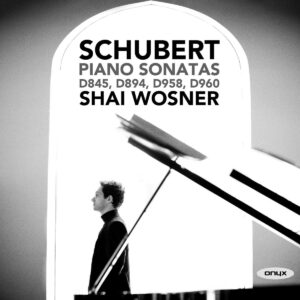Shai Wosner continues working his way through Schubert’s sonatas on disc, with largely distinctive results. In the A minor sonata’s opening Moderato, the pianist brings a variety of touch and emphasis to each iteration of the martial repeated-note theme, and manages to convey both unity and improvisatory impulse in the movement’s tempo fluctuations. He keeps the second-movement variations afloat and alive, pointing up felicitous turns of phrase and harmonic surprises with no more rhetorical underlining than necessary. Wosner articulates the Scherzo’s main theme with delightful lightness and bounce, (as if you’re hearing musical ping-pong balls!), while his measured tread in the Finale allows for uncommonly weighty and stern climaxes. In a catalogue that abounds with first-rate D. 845 recordings, Wosner’s counts among the most rewarding.
He takes the G major D. 894’s “Fantasie” subtitle on faith, unfolding the long first movement with an organic narrative flow complete with exposition repeat, where the phrases fall over the bar lines and hold your attention, just as they do in the second movement. The Scherzo goes in one beat to a bar, rather than a heavy three. Certain of the Rondo Finale’s slight pauses and tapered phrase endings are too self-aware for their own good, compared to the playful mood of Volodos’ comparably tricky voicings.
The C minor D. 958’s inner movements fare best in Wosner’s hands, while the outer movements, though extremely well executed, lack the large-scale fervency, drama, and dynamic range one hears from Andsnes, Richter, Arrau, Tirimo, and Endres, not to mention Brendel’s first and best traversal originally issued by Vanguard.
At first I thought Wosner’s terse treatment of the B-flat D. 960 first movement’s strange first ending overly militant, especially concerning his abrupt conclusion of the low trill. Perhaps the pianist wanted to show a marked contrast with the serenity and expressive economy he projects in the rest of the movement, and throughout the Adagio sostenuto. In the Scherzo’s quirky Trio, Wosner convincingly alters the volume and duration of the off-beat bass-note accents. Granted, one can surmise that Wosner overthinks those coy diminuendos in the first theme, and that he doesn’t generate enough tension in the second theme’s left-hand syncopations. However, few other pianists imbue the chordal dotted rhythms with comparable urgency and thrust, together with Wosner’s unambiguous accuracy. The pianist’s heartfelt, communicative artistry is that of a born Schubertian, and it’s touching that Wosner dedicates his persuasive and well-engineered performances to his mother’s memory.
































